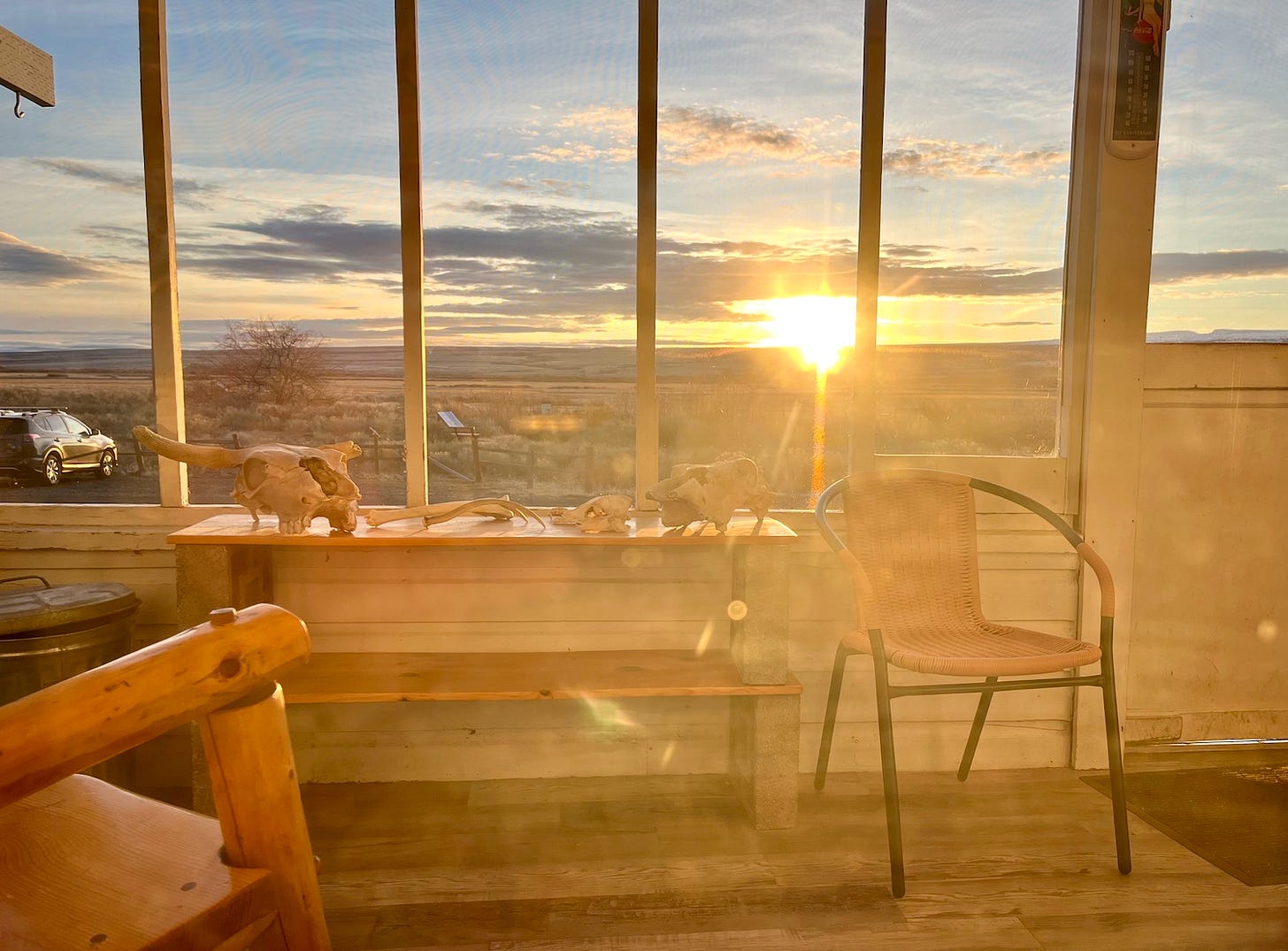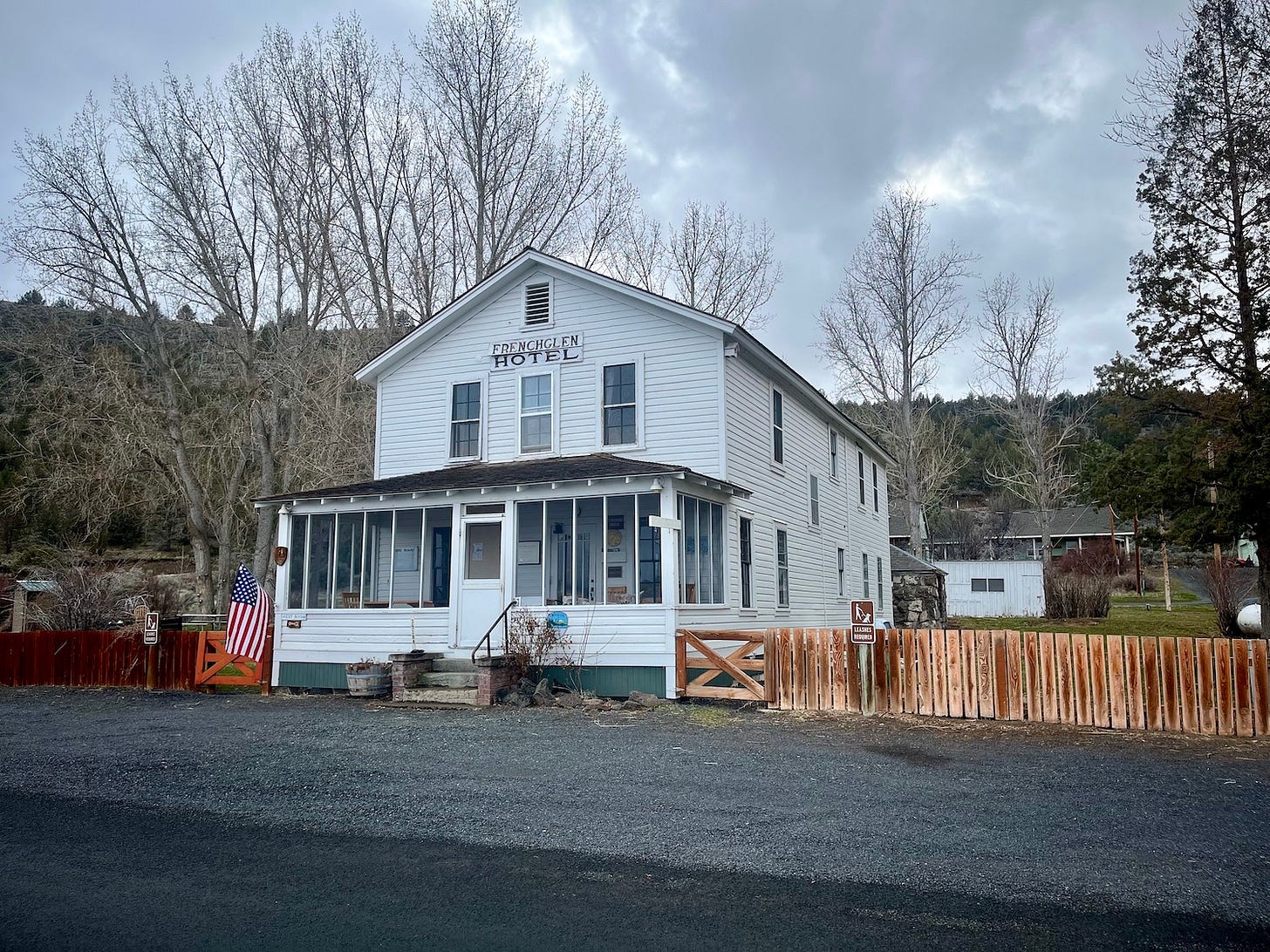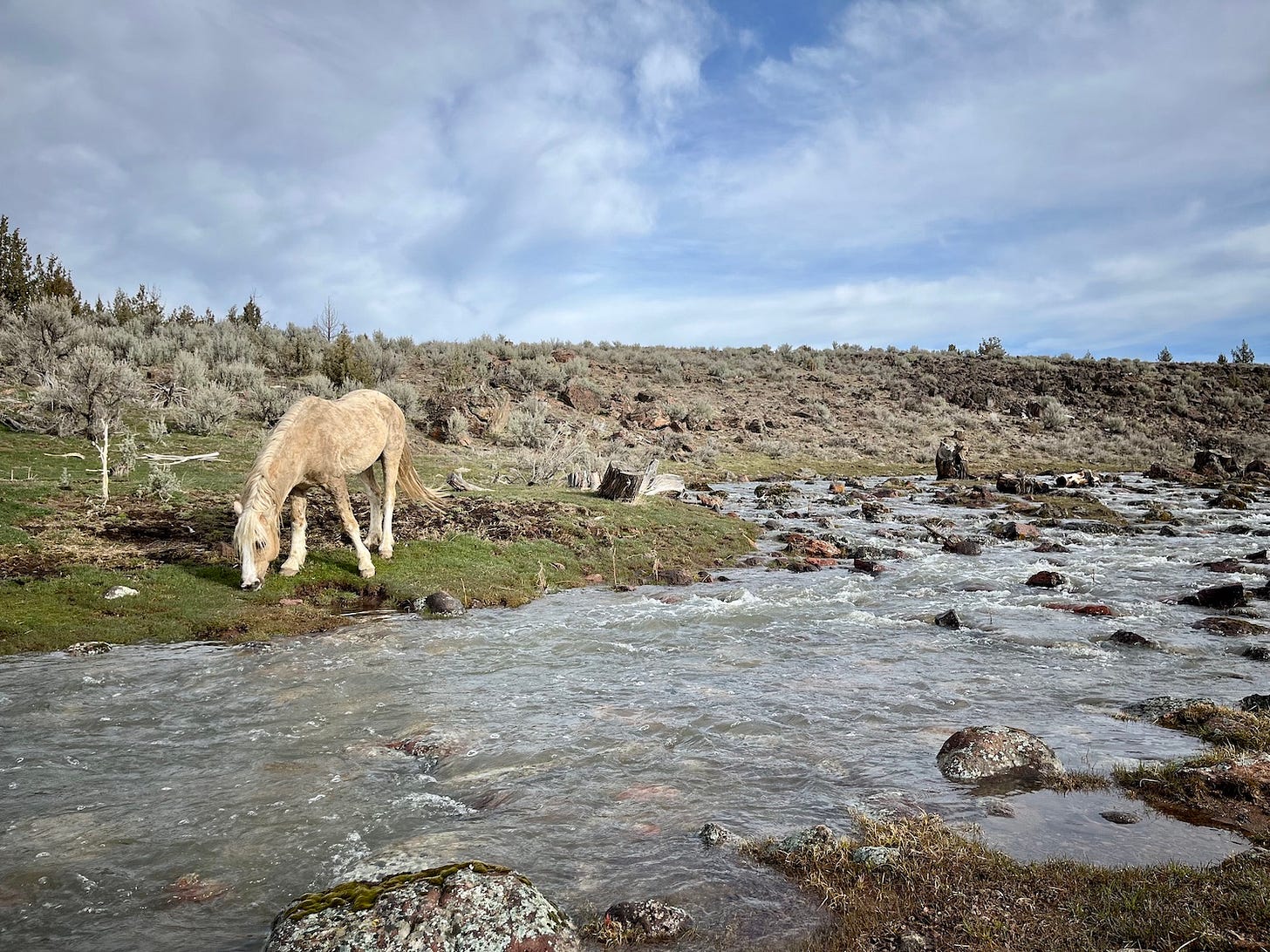I’m one week into my two-week road trip around Eastern and Southern Oregon. Yesterday was my second morning at the Frenchglen Hotel, in a town of either twelve or one-hundred-something residents, depending on who you ask and how much of the surrounding ranchland you include in its borders. Frenchglen sits right across the road from Malheur National Wildlife Refuge, at the northern end of the Great Basin, just before the two-lane highway swings south, up into the foothills that zip between rock walls and grassy fields. It is a place that is full of bird song, sagebrush, and more cows and wild horses than humans. I woke up early yesterday to watch the sunrise from the porch.
As I sat there waiting for a denim blue sky to blush pink, I pulled a random book off the shelf in the dining area. It was a thick hardcover, with big silky pages of desert photography. This was the first line I read from Fifty Miles From Home.
“When a buckaroo crew gathers a piece of country, whether it is canyon, ridgeline, or sagebrush flat, there is one person who takes the long circle, the outside circle. It is usually the boss, but it is always the person with the responsibility for making sure everything is gathered that can be gathered, and it is the person who will see what work needs to be done the next day…”
“Buckaroos” are a type of cowboy specific to Southeastern Oregon. They wear flat-brimmed hats instead of the curved ones you might see in Texas because the sun is so harsh out here; they need the extra shade. (The innkeeper told me this. She sees them in the grocery store sometimes, clinking around with their spurs and chaps.)
My first inclination upon reading that line was to feel a little squeamish about the phrase “gathers a piece of country,” as if land is there for the taking, just pieces of something to be scooped up and carried away. Then again, I know very little about the work of buckaroos or the roots of the trade. It’s something I’d like to learn more about. But in the moment, I couldn’t help but reread this line several times and think about how it might apply to writing about a place—how we gather details and snippets to circle some kind of story. As writers, it’s our job to take the long route.
Travel writing is inevitably extractive. We move through a place and we take pictures, take notes, take pieces of stories from people we’ll never really know. There have been a couple moments where I’ve seen that reality in a flash of discomfort or skepticism on someone’s face—especially in quiet towns like this one—when I tell them I’m here on a guidebook writing assignment. I imagine they’re asking themselves how I could possibly know what I’m talking about when I’m only spending a day or two in the place they call home.
Who does she think she is? I imagine them thinking. I ask myself this, too.
Then I tell them I don’t want to give away any of their secrets. I just want to help people get a feel for this place. What should a visitor know, as opposed to someone who lives here?
It helps me to think about guidebook writing or any kind of instructive travel writing as a different type of work entirely than the writing I might do about places I know really, really well, like Portland or the Connecticut shoreline.
When we embark on this kind of service writing in a place that is new(ish) to us and presumably new to our readers, it’s our job to take the long circle and try to gather up as much as we can. It’s also our job to be aware of how much we don’t know. These places we pop into for a night or two are not ours to know intimately, and that tension should keep us hyper-aware of getting the facts right, of being respectful to the depth of knowledge of those around us, and to the best of our ability, to interrogate our first impressions for inevitable misunderstandings. We can write about a hotel without presuming to know what it’s like to live next door to that hotel. But we have to remember that how we write about the hotel can have an impact on what it’s like to live in that town. And so, we tread lightly, thoughtfully. The same way we should “leave no trace” when hiking in the wilderness, we should try to leave no trace in the circles we write, because those circles might be tread again and again by other visitors follow our narrative on how/when/where to visit.
When we talk about “talking in circles,” we are indicating a failure to get to the point or talking in a way that avoids something. But I think we can look at writing in circles as an awareness that we might miss an important point. We leave room in the middle, intentionally, and that keeps us curious and wanting to learn more.
To write in circles, in this respect, is to do our very best to gather an admittedly limited perspective—to write vividly from where we stand and to gather what we can from the path we choose, leaving a wide open space for all we can not carry.
The opening essay of Fifty Miles From Home continues:
“It is not always possible to follow the cow-boss directive: ‘bring everything.’ But we have tried to bring what we could, and as for what is still out there, that is another circle.”
In that, there is comfort in all we do not know and can not know. We can take the long circle, gather important details, and bring our own limited perspective to the page and bring that story to life in hopes that it will inspire and instruct someone else on how to follow their own curiosities to new places and experiences. But we can only gather as much as we can carry. Much of it is not ours to hold.
The circles that can be driven or drawn are endless. And there will always be more to see, to know, to write.
Deadlines, Events, Education, and more
The Society for Environmental Journalists annual conference is coming up in Arizona, and there’s still time to register. I’ve been twice and it’s a great way to network with fellow writers and editors and gather a bunch of story ideas. Takes place April 23-25.
Lighthouse Writers is hosting a class on The “New” Travel Writing. Participants will “explore how a new generation of writers, including those from historically marginalized backgrounds, are creating a different canon of travel writing.” Three-hour zoom class is $100 for members and 110 for nonmembers. | April 19
Jami Attenberg’s #1000wordsofsummer takes place June 1-14. It’s a communal project in which everyone commits to writing 1,000 words a day for two weeks, and I’m finally going to do it this year! Join me? (I’ve heard great things about her book that lays the foundation for this, and I’m excited to listen to the audio version on the second half of my road trip.
Did you write about climate in 2024? Submit your work to The Covering Climate New Journalism Awards by March 31!
Upcoming Deadline: Impact Fund for Reporting on Health Equity and Health Systems | Apply by 3/26
Upcoming Deadline: The Awesome Foundation Grants: Conservation and Climate | Apply by 3/28
Upcoming Deadline: The McGraw Fellowship for Business Journalism | Apply by 3/31
Upcoming Deadline: Tin House Fall Residency | Apply by April 7
In The Weeds
Words I’m tangled in this week…
I gobbled up every word of this gorgeous essay by Priya Subberwal for Orion on queer theory and time and the stories that help or hinder us in moving through this difficult world. Here’s a favorite excerpt.
When I feel overwhelmed and find myself searching for different kinds of stories, I usually encounter them in ecology. I think about Mary Oliver and Alex Carr Johnson’s wild geese—migratory, seasonal, living their lives in cycles, following the light, always leaving and coming home. A life in iterations. I think of Sabrina Imbler’s immortal jellyfish aging backward, reverting to a juvenile body whenever they encounter an ailment, growing up over and over again. I feel a prickle of gratitude for all the mistakes I’ve made, watery wounds bringing me back to the start to try again. When I text my sister that I still don’t know what I want to be when I grow up, she replies “don’t worry, growing up is never-ending.” —Priya Subberwalon, The Shape of Time
One last thing. I was really, really hoping to see wild horses on this trip. And I did! Enjoy this moment of beauty I shared with a wild horse while he enjoyed he snacked on grass along a creek.
I’m hitting the road for Ashland, Oregon as soon as I hit send on this. More stories and updates coming soon!
Stay inspired,
Britany










Love this one!